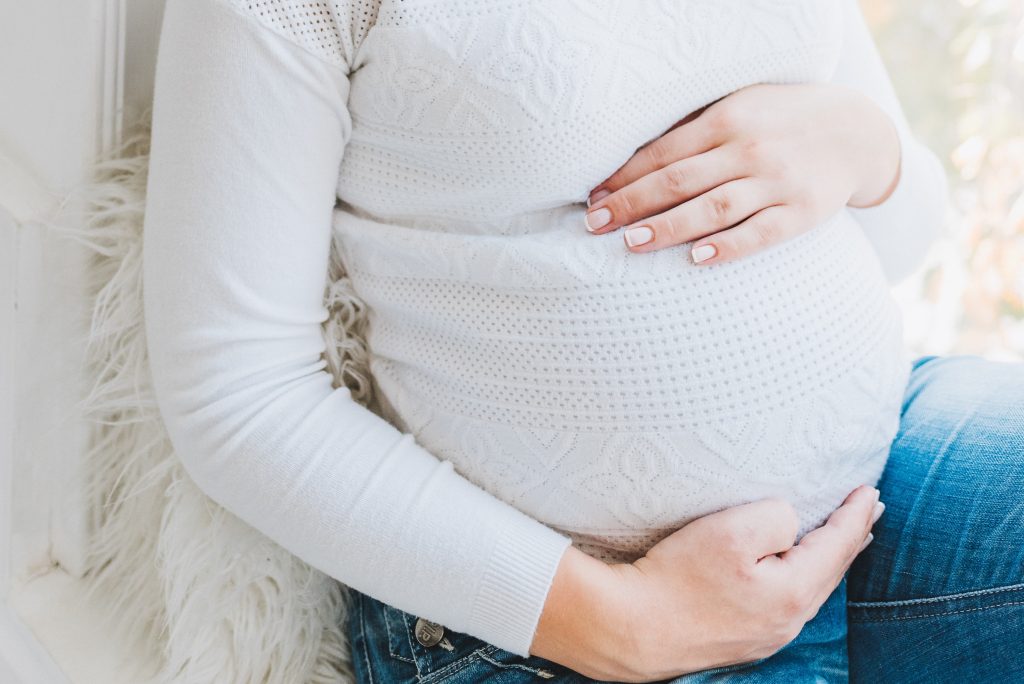
About one in three expectant mothers report elevated depression symptoms while pregnant (Lee et al., 2007), and depression during pregnancy has been reported to be as, or more, common than postpartum depression that occurs in the first few weeks after the baby is born (Evans et al., 2001; Miguez and Vazquez, 2021). Maternal antenatal depression often extends into the postpartum period (Robertson et al., 2004) and can have an impact on child outcomes, such as low birth weight and increased risk of emotional problems (Stein et al., 2014).
For these reasons, the perinatal period is a priority for prevention and management of mental health difficulties (Lewis et al., 2014). The need for early screening and intervention is evident, although there have been few controlled trials conducted exclusively during pregnancy. While existing interventions have been associated with small significant effects in mitigating perinatal depression, these findings are limited by a lack of randomisation and control groups (Dennis, Ross and Grigoriadis, 2007).
The US Preventive Services Task Force has described the need for large scale trials of interventions with good-quality study design, repeated measures across time, and with a focus on those at higher risk of depression (Curry et al., 2019). There is also a need for brief interventions that can be implemented into existing systems, to provide help in a timely manner (Burns et al., 2013) and within available resources.
Based on these recommendations and limitations in the existing evidence base, Hankin et al. (2023) conducted a randomised controlled trial (RCT), reporting data from The Care Project, comparing a brief interpersonal therapy (IPT) intervention (called ‘MOMCare’) to enhanced usual care (EUC) in pregnant women reporting elevated depression symptoms.

Despite discussion of the importance of early intervention in perinatal depression, there are very few controlled trials conducted during the prenatal period with higher risk individuals.
Methods
939 prospective participants were approached from obstetric clinics in two major Denver, Colorado (US) hospitals between July 2017 and August 2021. Participants were eligible for inclusion in the trial if they were aged 18-45 years, spoke English, were at 25 or fewer weeks gestation with a singleton pregnancy, and had demonstrated elevated depression symptoms through a score of 10 or more on the Edinburgh Postnatal Depression Scale (EPDS; Cox, Holden, and Sagovsky, 1987). Participants were excluded if they were using drugs or prescribed methadone, had any major health conditions requiring interventions like chemotherapy or blood transfusions, or had any current or past psychotic or manic episodes. Participants were also ineligible if they were receiving Cognitive Behavioural Therapy (CBT) or IPT at the time of the study. The final study sample was 234 pregnant mothers.
Firstly, a baseline evaluation, including the EPDS as well as the 20-item symptom checklist (SCL-20) of depression symptoms and a structured clinical interview (SCID-5) to determine a diagnosis of Major Depressive Disorder (MDD) according to the DSM-5 (APA, 2013), was administered. Secondly, all participants were randomly allocated to either receive brief interpersonal therapy (IPT) or enhanced usual care (EUC) provided by obstetric clinics, using a computer-generated random numbers sequence. 115 participants were randomly allocated to IPT (brief interpersonal therapy), and 119 to EUC (enhanced usual care).
The ‘MOMCare’ IPT intervention consisted of eight 1:1 weekly sessions lasting 50-minutes each. Participants were taught the links between feelings and interactions with others, and to learn strategies for resolving conflicts. Multidisciplinary elements of MOMCare included community support and antidepressant medications. EUC consisted of maternity support services and integrated counselling, with one 1:1 60-minute session used to review psychoeducational materials and ways participants could talk to families or partners for support and offer psychiatric consultation and medications. EUC incorporated community resources such as information about alternative counselling and resources services, housing programmes.
The study measures (EPDS, SCL-20, SCID-5) used at baseline were completed 3-5 times prenatally and then at 36 weeks gestation, which was considered ‘end of gestation’.
Blinded evaluators employed hierarchical linear modelling and linear regression methods to examine changes in SCL-20 and EPDS scores, and in MDD diagnosis, respectively. They also included a power calculation of their sample size, which was estimated to be 95% to detect a moderate effect, despite the sample being smaller than expected following a pause in participant recruitment due to the Covid-19 pandemic. All participants, including those receiving no intervention were included in intent-to-treat analyses.
Results
In terms of demographics, 43% of the sample were from White ethnic groups, 24.8% identified as ‘mixed’, 18% as Latinx, 9% as Black, 4% as Asian, and 0.4% as Hawaiian or Pacific Islander. Just over 40% were living at or close to the threshold of poverty at the time of the study. Nine participants in the IPT arm did not participate. Overall, retention rates were high across both EUC and IPT conditions, at 87% and 88% respectively.
EPDS depression scores improved significantly from assessment to end of gestation for participants receiving IPT, and improved more rapidly in IPT participants than in EUC participants. Depression scores, as measured by the SCL-20, also improved significantly for participants receiving brief IPT, but not for participants receiving EUC.
When comparing EPDS depression scores, the IPT condition was seen to significantly separate from the EUC condition by 11 weeks post-randomisation. For SCL-20 scores this took only 6-7 weeks. The rate of depressive disorder diagnosis in IPT participants also decreased significantly, compared to EUC participants.
Additional variables were examined as potential moderators of these treatment effects. Neither Major Depressive Disorder (MDD) diagnosis at assessment or at end of gestation, nor gestational age at randomisation, were found to moderate the treatment effects of the brief IPT intervention. Likewise, neither the Covid-19 pandemic nor the use of psychiatric medications moderated outcome effects.

In this trial, eight 1:1 sessions of brief interpersonal therapy significantly lessened symptoms of depression and rates of major depressive disorder in a sample of 234 pregnant women, compared with enhanced usual obstetric care.
Conclusions
Maternal depression during pregnancy is common, with a range of impacts for the mother and for her child. Using a randomised design, Hankin et al. (2023) demonstrated that brief IPT can significantly reduce prenatal depressive symptoms and MDD rates, compared to enhanced treatment as usual, in an ethnically and social-economically diverse sample recruited from obstetric clinics in the US. The effectiveness of this intervention demonstrates that brief IPT could relieve perinatal depression, with the potential for intergenerational benefits.

The effectiveness of brief interpersonal therapy identified in this trial presents it as an appropriately safe and efficient intervention for prenatal maternal depression, with potential positive impacts for offspring.
Strengths and limitations
This RCT addressed specific recommendations made by the US Preventive Services Task Force to address limitations in existing research, which is mostly correlational, and therefore limited for drawing causal conclusions without “the experimental control gained through intervention” (O’Connor et al., 2016). The study followed CONSORT (Schulz, Altman, and Moher, 2010) reporting guidelines, and the Care Project has been registered on ClinicalTrials.gov. Alongside comprehensive reporting of the methods and findings, including a power calculation and repeated measures, this demonstrates the robust methods that were employed by the study group.
The results of this trial demonstrated larger effect sizes than the pooled average across previous literature, as reported by the US Preventive Services Task Force (Curry, 2019). The study sample was also highly powered, ethnically diverse, and recruited via routine obstetric screening, making the findings “robust and generalizable” (Hankin et al., 2023) to populations of at-risk mothers in real-life settings.
One important aspect of the MOMCare IPT intervention is the inclusion of community support resources, alongside a psychological focus on interpersonal competence and managing conflict. These resources included housing programmes and access to centres providing postpartum support. Depression in the perinatal period is closely associated with important social factors including employment and income (O’Hara and Swain, 1996). When carefully designed with these social contributors in mind, much like the MOMCare intervention, IPT can be a comprehensive and effective psycho-social intervention (Stuart and Koleya, 2014; Grote, Swarts, and Zuckoff, 2008).
However, the study sample included only English-speaking participants. Research has demonstrated that language barriers can be significant obstacles for women with perinatal mental illness to access services (Smith et al., 2019), and that pregnant women with a language barrier experience exacerbated loneliness (O’Mahony et al., 2012). Loneliness itself is linked to depression (Achterbergh et al., 2020), and women from migrant backgrounds may be especially affected through a lack of support systems and separation from cultural practices (Adlington et al., 2023), as well as language barriers. The outcomes of this study alone cannot be generalised to these populations. Interventions for depression have shown larger effect sizes when adapted for specific populations (Stuart and Koleva, 2014). Therefore, future research would benefit from examining the effectiveness of interventions when adapted to language and culture, using existing literature (Nisar et al., 2020) to inform adaptations of ‘MomCare’ IPT for non-English speaking mothers, especially those from migrant backgrounds.

The study sample in this RCT was highly powered, ethnically diverse, and recruited via routine obstetric screening, making the findings robust and generalizable to at-risk mothers in real-life settings.
Implications for practice
The brief IPT intervention was effective rapidly after beginning treatment, regardless of MDD status or gestational age at baseline. This supports the drive for early intervention in prenatal depression (Austin, 2004; O’Connor et al., 2016), but also demonstrates how pregnant women who do not receive early screening or intervention are still able to benefit from brief IPT. This is significant when considering how services and interventions can best reduce barriers to care.
Implications for research
The findings of this trial will inform subsequent research within The Care Project. Specifically, newborns will be followed from birth into childhood, to examine the effects of mitigating mothers’ depression during pregnancy on the development of risk mechanisms for later psychopathology in the infants.
Implications for policy
Considering NHS Long Term commitments that “maternity outreach clinics will integrate maternity, reproductive health, and psychological therapy” (NHS Long Term Plan, 2019, p. 49), it is relevant that Hankin et al. (2023) recruited directly from usual obstetric services. These are therefore participants who could feasibly benefit from policy changes relating to treatment during the perinatal period.
Recommendations have also been made to improve access to “parent-infant, couple, co-parenting and family interventions” (NHS Long Term Plan, 2019, p. 49). As IPT is designed to build interpersonal skills to reduce conflicts and understand the association between interpersonal relations and depression symptoms, this trial is highly relevant when considering how the NHS can move towards meeting these commitments within existing service structures and resources.

This intervention was effective rapidly after beginning treatment. This supports the drive for early intervention in prenatal depression, but also demonstrates how pregnant women who do not receive early screening or intervention are still able to benefit from brief interpersonal therapy.
Statement of interests
No conflict of interest.
Links
Primary paper
Hankin BLDemers CHHennessey EP, et al. Effect of Brief Interpersonal Therapy on Depression During Pregnancy: A Randomized Clinical Trial. JAMA Psychiatry. 2023;80(6):539–547. 10.1001/jamapsychiatry.2023.0702
Other references
Achterbergh, L., Pitman, A., Birken, M., Pearce, E., Sno, H., & Johnson, S. (2020). The experience of loneliness among young people with depression: a qualitative meta-synthesis of the literature. BMC psychiatry, 20(1), 1-23.
Adlington, K., Vasquez, C., Pearce, E., Wilson, C. A., Nowland, R., Taylor, B. L., … & Johnson, S. (2023). ‘Just snap out of it’–the experience of loneliness in women with perinatal depression: a Meta-synthesis of qualitative studies. BMC psychiatry, 23(1), 1-24.
American Psychiatric Association. (2013). Diagnostic and statistical manual of mental disorders, DSM (5th ed.). Washington, DC.
Austin, M. P. (2004). Antenatal screening and early intervention for “perinatal” distress, depression and anxiety: where to from here?. Archives of Women’s Mental Health, 7, 1-6.
Burns, A., O’Mahen, H., Baxter, H., Bennert, K., Wiles, N., Ramchandani, P., … & Evans, J. (2013). A pilot randomised controlled trial of cognitive behavioural therapy for antenatal depression. BMC psychiatry, 13(1), 1-12.
Cox, J. L., Holden, J. M., & Sagovsky, R. (1987). Detection of postnatal depression: development of the 10-item Edinburgh Postnatal Depression Scale. The British journal of psychiatry, 150(6), 782-786.
Curry, S. J., Krist, A. H., Owens, D. K., Barry, M. J., Caughey, A. B., Davidson, K. W., … & US Preventive Services Task Force. (2019). Interventions to prevent perinatal depression: US Preventive Services Task Force recommendation statement. Jama, 321(6), 580-587.
Dennis, C. L., Ross, L. E., & Grigoriadis, S. (2007). Psychosocial and psychological interventions for treating antenatal depression. Cochrane Database of systematic reviews, (3).
Evans, J., Heron, J., Francomb, H., Oke, S., & Golding, J. (2001). Cohort study of depressed mood during pregnancy and after childbirth. Bmj, 323(7307), 257-260.
Grote, N. K., Swartz, H. A., & Zuckoff, A. (2008). Enhancing interpersonal psychotherapy for mothers and expectant mothers on low incomes: Adaptations and additions. Journal of contemporary psychotherapy, 38, 23-33.
Lee, A. M., Lam, S. K., Lau, S. M. S. M., Chong, C. S. Y., Chui, H. W., & Fong, D. Y. T. (2007). Prevalence, course, and risk factors for antenatal anxiety and depression. Obstetrics & Gynecology, 110(5), 1102-1112.
Lewis, A. J., Galbally, M., Gannon, T., & Symeonides, C. (2014). Early life programming as a target for prevention of child and adolescent mental disorders. BMC medicine, 12(1), 1-15.
Míguez, M. C., & Vázquez, M. B. (2021). Risk factors for antenatal depression: A review. World journal of psychiatry, 11(7), 325.
O’Hara, M. W., & Swain, A. M. (1996). Rates and risk of postpartum depression—a meta-analysis. International review of psychiatry, 8(1), 37-54.
Chapter 3: Further progress on care quality and outcomes. (2019). In The NHS long term plan (p. 49). London: NHS England. Retrieved from https://www.longtermplan.nhs.uk/wp-content/uploads/2019/08/nhs-long-term-plan-version-1.2.pdf
Nisar, A., Yin, J., Yiping, N., Lanting, H., Zhang, J., Wang, D., … & Li, X. (2020). Making therapies culturally relevant: translation, cultural adaptation and field-testing of the Thinking Healthy Programme for perinatal depression in China. BMC pregnancy and childbirth, 20, 1-10.
O’Connor E, Rossom RC, Henninger M, Groom HC, Burda BU. Primary care screening for and treatment of depression in pregnant and postpartum women: evidence report and systematic review for the US Preventive Services Task Force.JAMA. 2016;315(4):388-406. do
O’Mahony, J. M., Donnelly, T. T., Bouchal, S. R., & Este, D. (2012). Barriers and facilitators of social supports for immigrant and refugee women coping with postpartum depression. Advances in nursing science, 35(3), E42-E56.
Robertson, E., Grace, S., Wallington, T., & Stewart, D. E. (2004). Antenatal risk factors for postpartum depression: a synthesis of recent literature. General hospital psychiatry, 26(4), 289-295.
Schulz, K. F., Altman, D. G., & Moher, D. (2010). CONSORT 2010 statement: updated guidelines for reporting parallel group randomised trials. Journal of Pharmacology and pharmacotherapeutics, 1(2), 100-107.
Smith, M. S., Lawrence, V., Sadler, E., & Easter, A. (2019). Barriers to accessing mental health services for women with perinatal mental illness: systematic review and meta-synthesis of qualitative studies in the UK. BMJ open, 9(1), e024803.
Stein, A., Pearson, R. M., Goodman, S. H., Rapa, E., Rahman, A., McCallum, M., … & Pariante, C. M. (2014). Effects of perinatal mental disorders on the fetus and child. The Lancet, 384(9956), 1800-1819.
Stuart, S., & Koleva, H. (2014). Psychological treatments for perinatal depression. Best practice & research Clinical obstetrics & gynaecology, 28(1), 61-70.
Photo credits
- Photo by Suhyeon Choi on Unsplash
- Photo by Scott Graham on Unsplash
- Photo by Anastasiia Chepinska on Unsplash
- Photo by Hu Chen on Unsplash
- Photo by Vardan Papikyan on Unsplash
- Photo by Dakota Corbin on Unsplash
